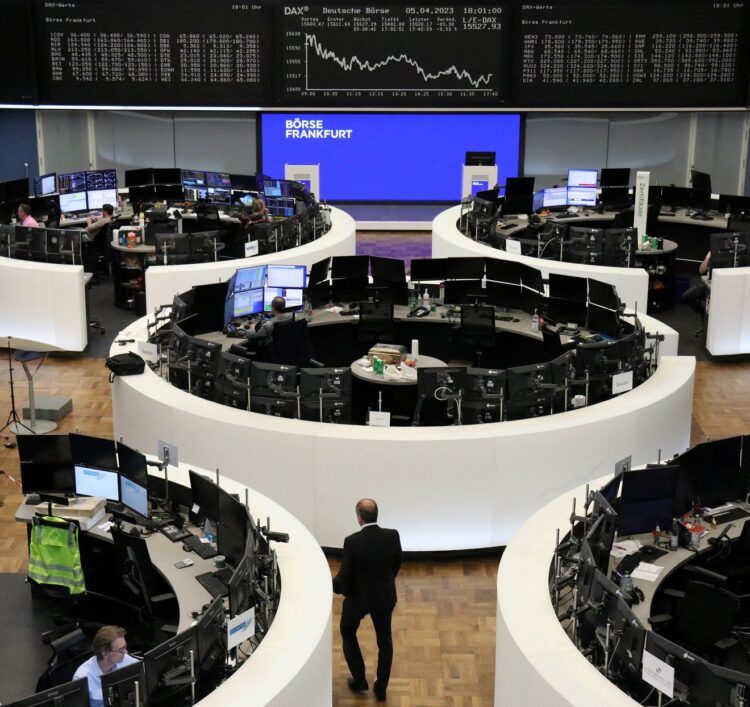Publisher: Maaal International Media Company
License: 465734
Collapse, losses and confusion… What is happening in global financial markets?
اقرأ المزيد
The Japanese stock market fell 12% on Monday, its worst day in 37 years, as global markets were shaken by the prospect of a recession in the United States.
Black Monday: In a defeat repeated in other Asian markets, the Topix index erased its gains for the year, and witnessed the biggest sell-off since “Black Monday” in October 1987.
In Europe, the benchmark Stoxx Europe 600 index fell 2.2%, according to the Financial Times. Futures markets indicated that the momentum is likely to extend to the United States.
Contracts tracking the Nasdaq 100 index were trading 3.8% lower, while the S&P 500 was expected to open 2.3% lower.
Dealers in Tokyo said the selling was part of a major correction and a move to reduce risks by global funds. But Tokyo stocks were also hurt by the yen, which has strengthened by about 12% since mid-July.
On Monday, the yen rose 3% to 142.27 yen per dollar. “Japan seems to be at the center of a lot of the action today. There seems to be a real broad-based sell-off in Japan by global funds,” said Jason Liu, head of equity and derivatives strategy for Asia-Pacific at BNP Paribas.
The global declines come amid concerns that the Federal Reserve has been too slow to respond to signs of weakness in the U.S. economy and may have to catch up with a series of rapid rate cuts. Markets are currently pricing in 1.25 percentage points — five quarter-point cuts — across the Fed’s final three meetings this year.
Investor concerns: Investor concerns about the health of the world’s largest economy and rising tensions between Israel and Iran have added to pressure on a market already reeling from an exodus of investors from high-flying technology stocks. “I don’t expect a short-term rebound because right now we have this perfect storm of weaker Japanese trading, weakness in big tech in the US and tensions in the Middle East,” said Seema Shah, chief global strategist at Principal Asset Management.
Circuit breakers: Futures on the VIX index of expected turmoil in the US stock market — known as Wall Street’s “fear gauge” — rose above 40 points on Monday, the highest since the early days of the Covid-19 pandemic. Trading in the Topix and Nikkei futures was suspended during the afternoon session as the selloff continued into the close, hitting “circuit breaker” levels that automatically halt trading.
In Korea, similar circuit breakers were triggered for the first time in four years. Traders in Tokyo at three different brokerages said they knew of several large hedge fund clients who were ordered to close their positions as losses mounted. Circuit breakers are emergency control measures that halt trading to limit panic selling for a certain period on an exchange. Global turmoil: The sell-off in Japan was echoed in other Asian markets. South Korea’s benchmark Kospi index fell 8.8%, while Australia’s S&P/ASX index fell 2.5%. India’s Sensex lost 2.6%.
The global turmoil spilled over into cryptocurrencies, with bitcoin down about 16% to $52,740, while ether, another cryptocurrency, fell about 17% to $2,200.
The Fed held interest rates steady when it met last week, but the market’s reaction to the jobs data suggests investors think the central bank may have made a mistake by not cutting rates. JPMorgan economists joined a growing chorus of Wall Street strategists over the weekend calling for the Fed to cut rates by 0.5 percentage points at its next two meetings. Srini Ramaswamy, managing director of U.S. fixed income research at JPMorgan, pointed to investors’ new uncertainty about the path of interest rates and a lack of liquidity in the summer.
The technology-heavy Nasdaq Composite ended the week down 3.4% and has fallen more than 10% since its all-time high in July. Treasuries were also hurt, with the yield on the 10-year Treasury note hitting its lowest since December at 3.82%.
Meanwhile, Warren Buffett’s Berkshire Hathaway Inc. revealed earlier this week that it cut its stake in Apple Inc. in half in the second quarter, while raising its cash holdings to a record $277 billion and buying Treasuries.
“I think interest rates are too high,” said Rick Rieder, chief investment officer of global fixed income at BlackRock. While the economy was still “relatively strong,” Rieder said the Fed needs to raise rates to around 4% “sooner rather than later.”









